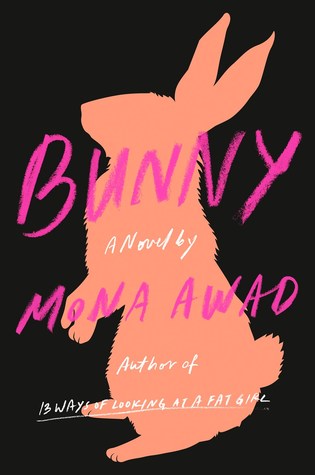
Bunny by Mona Awad
It is tough to nail down the genre of Bunny, A Novel by Mona Awad. Is it noir? Horror? Crime fiction? Is it an acid flashback from that tab you dropped stupidly in college? Or maybe we will just call it Literary, the great catch-all for all exceptionally well-written works that often defy description.
Whatever you call it, this novel is fascinatingly dark, wonderfully experimental, and guaranteed to make you cringe in your reading chair, even as you crack a smile at the wit underlying the wickedness. I love stories that play with the dark and the light in this way, punctuating the narrative with shades of each. I love to write them for that matter. Both my novel, Petra’s Ghost as well as The Starr Sting Scale, play the horrific off the hilarious at times. I think it may serve as a metaphor for life. Or maybe just my life, who’s to say?
But even Awad’s black comedy exploration of body image in 13 Ways of Looking at a Fat Girl couldn’t have prepared me for the triumph in gallows humour that Bunny provides. Don’t get me wrong, you won’t be guffawing your way through this one. The humour is much more sly and subtle than that. In this way, it mirrors the behavior of the women in the book that the protagonist, Samantha Heather Mackey refers to as the Bunnies, the primped and presumptuous fellow members of her MFA fiction writing cohort. Their cliquey dismissal of Samantha’s work never varies from one to the other, thinly disguised as constructive feedback. Dark but like not in a good way? Sort of in love with its own outsiderness, you know? Their bonded together cruelty is insidious, cloaked in pretentious false insight. They are the kind of girls who whisper to one another behind their hands while staring at you, and then dissolve into laughter that makes you question not only what you wore that day but your very existence.
Samantha and her friend, Ava make their own casually catty jokes about these grown women who hug each other and scream “I love you, Bunny!” every time they meet like a bunch of vacuous valley girls. They even have code names for them. Creepy Doll. Cupcake. The Duchess. One of my favourites was Vignette, which if you look up in the dictionary has a further meaning of a portrait “which fades into its background without a definite border.” The Bunnies have no borders. They travel and think en masse, like a colony of Portuguese Man of War dressed in high heels.
That being said, almost every outsider secretly desires to be “in.” It’s not fun to be left out in the cold. Particularly at the prestigious university campus that Samantha and the Bunnies attend, where mysterious murders seem to be occurring with far too much regularity for my taste, often with beheadings thrown in for good measure. One wonders at the acceptance of this violence in a New England university town. I used to live in Connecticut years ago, and I would have thought a good decapitation might threaten enrollment numbers in a serious way in that neck of the woods. But perhaps the prolific use of guns in the U.S. makes the dispatch of a victim by hatchet somehow quaint and thus in keeping with the New England aesthetic, like clam bakes in Maine.
Regardless, as I said, many people harbour a secret wish to be part of the in-crowd, even as we are being persecuted by them. Just ask the girl who got pig’s blood dumped on her and John Travolta at the prom in the Stephen King film. So, when Samantha receives a smiley-faced encrusted invitation folded into an origami swan in her school mailbox to one of the Bunnies’ private “Smut Salon” parties, she goes. Later, she will wish she hadn’t.
But you, as the reader. will be glad that she did. Because herein lies Awad’s weird and superbly written story.
Whatever you choose to call it.
To find out more about Bunny and the author, Mona Awad, go to http://mona-awad-grou.squarespace.com/



